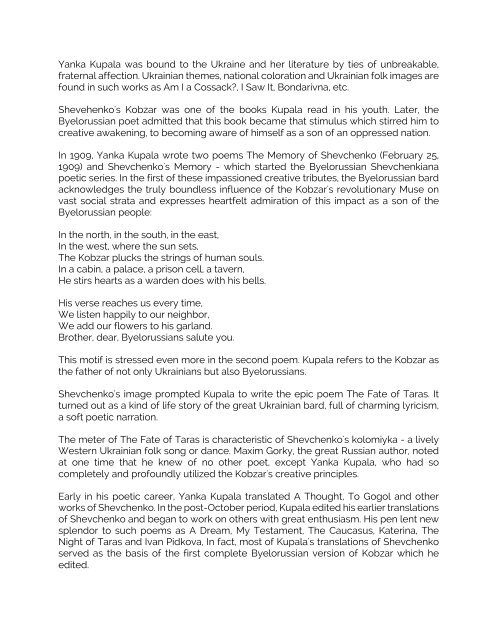PoetsGardenArrowParkNY_dl
You also want an ePaper? Increase the reach of your titles
YUMPU automatically turns print PDFs into web optimized ePapers that Google loves.
Yanka Kupala was bound to the Ukraine and her literature by ties of unbreakable,<br />
fraternal affection. Ukrainian themes, national coloration and Ukrainian folk images are<br />
found in such works as Am I a Cossack?, I Saw It, Bondarivna, etc.<br />
Shevehenko's Kobzar was one of the books Kupala read in his youth. Later, the<br />
Byelorussian poet admitted that this book became that stimulus which stirred him to<br />
creative awakening, to becoming aware of himself as a son of an oppressed nation.<br />
In 1909, Yanka Kupala wrote two poems The Memory of Shevchenko (February 25,<br />
1909) and Shevchenko's Memory - which started the Byelorussian Shevchenkiana<br />
poetic series. In the first of these impassioned creative tributes, the Byelorussian bard<br />
acknowledges the truly boun<strong>dl</strong>ess influence of the Kobzar's revolutionary Muse on<br />
vast social strata and expresses heartfelt admiration of this impact as a son of the<br />
Byelorussian people:<br />
In the north, in the south, in the east,<br />
In the west, where the sun sets,<br />
The Kobzar plucks the strings of human souls.<br />
In a cabin, a palace, a prison cell, a tavern,<br />
He stirs hearts as a warden does with his bells.<br />
His verse reaches us every time,<br />
We listen happily to our neighbor,<br />
We add our flowers to his garland.<br />
Brother, dear, Byelorussians salute you.<br />
This motif is stressed even more in the second poem. Kupala refers to the Kobzar as<br />
the father of not only Ukrainians but also Byelorussians.<br />
Shevchenko's image prompted Kupala to write the epic poem The Fate of Taras. It<br />
turned out as a kind of life story of the great Ukrainian bard, full of charming lyricism,<br />
a soft poetic narration.<br />
The meter of The Fate of Taras is characteristic of Shevchenko's kolomiyka - a lively<br />
Western Ukrainian folk song or dance. Maxim Gorky, the great Russian author, noted<br />
at one time that he knew of no other poet, except Yanka Kupala, who had so<br />
completely and profoun<strong>dl</strong>y utilized the Kobzar's creative principles.<br />
Early in his poetic career, Yanka Kupala translated A Thought, To Gogol and other<br />
works of Shevchenko. In the post-October period, Kupala edited his earlier translations<br />
of Shevchenko and began to work on others with great enthusiasm. His pen lent new<br />
splendor to such poems as A Dream, My Testament, The Caucasus, Katerina, The<br />
Night of Taras and Ivan Pidkova, In fact, most of Kupala's translations of Shevchenko<br />
served as the basis of the first complete Byelorussian version of Kobzar which he<br />
edited.


